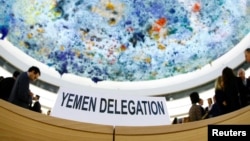The United Nations has raised more than half of the $2.1 billion it needs to provide life-saving assistance for millions of people on the brink of famine in war-torn Yemen at a high-level pledging conference for the Yemen crisis Tuesday.
International donors pledged $1.1 billion, and U.N. Secretary-General Antonio Guterres called it “a remarkable success.”
“We are only in April,” Guterres said. “This represents a very encouraging signal that, indeed, we will be able to achieve our target by the end of the year.
“That was only possible thanks to the very clear generosity and solidarity of many member states and also different organizations of civil society that have pledged today," he added.
The foreign ministers of Switzerland and Sweden, who co-hosted the daylong event with the U.N., said they also were “encouraged by the response.”
Several humanitarian organizations, however, expressed disappointment at the outcome. In a statement, Oxfam, the British charity said “the international community has fallen short in its support for the Yemeni people.”
'Life and death'
Mutasim Hamdan, Yemen country director of the Norwegian Refugee Council, said that the pledges mean “the difference between life and death for millions of people.”
“I fail to grasp how the international community can see this crisis unfold without doing its outmost to limit the suffering that Yemenis are facing," Hamdan said.
The United Nations calls Yemen the world’s worst humanitarian crisis, noting that this war-torn, impoverished country also is one of the world’s most forgotten crises.
Since the U.N. lodged its multibillion-dollar humanitarian appeal in early February, only 15 percent of the money has been received, which Guterres said was far from enough to tackle the immense tragedy that was unfolding in Yemen.
He said about 17 million people in Yemen are food insecure and 7 million are facing starvation, making this “the world’s largest hunger crisis.”
Guterres said nearly two-thirds of the population, or almost 19 million people, needed emergency support and that the U.N. was aiming to provide vital aid to 12 million people facing the threat of famine and death.
“As always, children are at highest risk of death," he said. "On average, a child under the age of 5 dies of preventable causes in Yemen every 10 minutes.
“And this means 50 children in Yemen will die during today’s conference -- and all those deaths could have been prevented,” Guterres added.
Humanitarian access
Besides money, Guterres said it was important “to make sure that there is unhindered access for all humanitarian actors to reach all the people in need.”
Robert Mardini, International Committee of the Red Cross director for the Middle East, agreed that severe restrictions placed on the import of food, fuel and medicine and “the movement of such goods and medicines within the country” had to be lifted.
“People are suffering and dying not just from the fighting, but from chronic illnesses and disease.” He said if this stranglehold were relaxed “it will help greatly in the relief of the peoples’ suffering.”
The United Nations estimates that at least 10,000 people have been killed, countless thousands injured, and more than 3 million forced from their homes. It reports more than two years of civil war has devastated Yemen’s economy, and damaged or destroyed nearly 300 health facilities.
Basic services have collapsed, putting millions at risk of disease and other threats. Before the war, Yemen was one of the poorest countries in the world.
The U.N. reports conditions have further deteriorated and Yemen now has the highest maternal mortality rates in the region. The U.N. children’s fund reports nearly 2.2 million children are malnourished, including a half-million who are severely malnourished and “at imminent risk of death” if they do not get specialized treatment.
Stephen O’Brien, under-secretary-general for Humanitarian Affairs, said agencies have reached 5.8 million people across the country this year.
O'Brien said the U.N. and its partners could scale-up humanitarian operations and help many more people if donors provide the money needed.
“We can avert famine and the worst catastrophe, if we have access,” he said.
At the pledging conference, Yemen Prime Minister Ahmed Obaid Mubarek Bin-Dagher provided a glimpse of the tensions reigning in his country. He accused the Houthi rebels of destroying infrastructure and houses by “invading” cities such as Sana'a, Taiz and Aden.
He thanked the U.N. for holding the pledging event and thanked Saudi Arabia for “assistance that has reached various cities.”
What the prime minister left unsaid was that the war in Yemen escalated significantly after the Saudi-led coalition began bombing the Houthi rebels at the end of March 2013 in support of his government.
Significant pledges
Saudi Arabia has pledged to give $150 million, which Abdullah Al-Rabeeah, adviser to the Royal Court of Saudi Arabia, said was “in addition to $100 million provided since the beginning of 2017.”
Other significant contributions were made by the European Union, which pledged $110 million and the United States, which announced an additional contribution of $94 million.
Thomas Staal, counselor for the U.S. Agency for International Development (USAID), said the contribution brought “the total U.S. humanitarian aid to Yemen to nearly $526 million.”
While recognizing the importance of responding to this urgent crisis with humanitarian aid, Staal said this was not enough.
“A political solution must be found to establish the peace that the people of Yemen so richly deserve,” he said.
U.N. Chief Guterres agreed there was no military solution, only a political one.
“It is important that the parties to the conflict understand this is a war in which everyone is losing,” he said.




